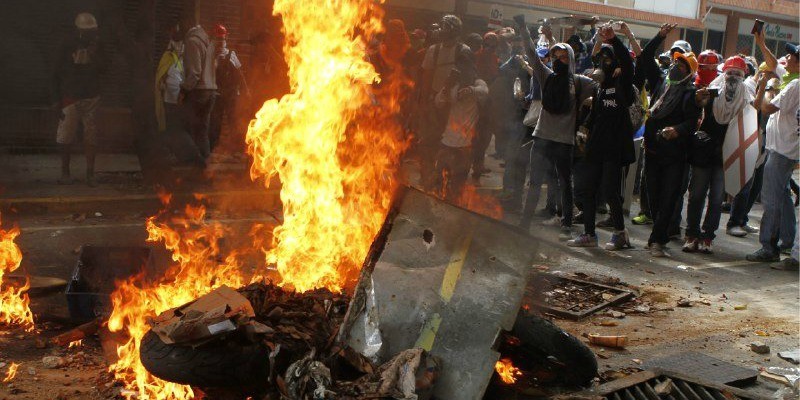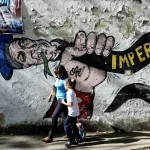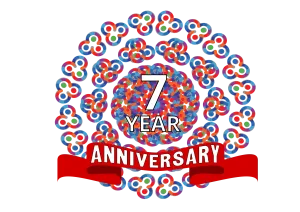
Lucas Koerner and Gabriel Hetland engage in an animated debate about critique, solidarity, and the “left” media’s role in Venezuela.
By Lucas Koerner / Gabriel Hetland – FAIR / Venezuelanalysis on February 18, 2020
Critique, Solidarity and Movement Building: A Reply to Lucas Koerner
by Gabriel Hetland
Lucas Koerner’s recent piece for Fairness & Accuracy In Reporting, “How Western Left Media Helped Legitimate US Regime Change in Venezuela” (1/22/20), is a leading exemplar of a genre of leftist thought which might be termed “shotgun leftism,” due to its self-professed “uncompromising” commitment to revolutionary movements and states, and harsh “shoot-‘em-up” stance towards anyone deemed to lack such a commitment. This stance is evident in this and other pieces, in which Koerner takes aim at leftist publications such as NACLAand Jacobin, and a growing list of writers, including myself. This style of leftism contains a mix of admirable, questionable and highly untenable features.
The admirable features are a commitment to grassroots movements and to establishing a participatory and egalitarian socialist society, and a relentless critique of imperialism.
More questionably, shotgun leftists offer “unequivocal” support to governments identified as leftist, revolutionary and/or anti-imperialist, e.g., Venezuela, Cuba, Bolivia under Evo Morales, and Nicaragua, and in some versions of the genre, any state opposed by the United States. What is questionable is not supporting left/revolutionary states, but doing so unequivocally. This can and often does lead to willingness to turn a blind eye to these states’ objectionable, even appalling actions, including widespread extra-judicial killings, and suppression of political liberties that leftists around the world have fought and died for.
What is untenable is shotgun leftists’ willingness to repeatedly, grossly and at times seemingly deliberately misrepresent, and even fabricate, others’ words. This is problematic, to say the least, in three ways. First, it makes it difficult to trust the veracity of what is said. Second, it inhibits building an effective anti-imperialist movement. And third, it blocks possibilities for open and honest debate.
Koerner argues that leftist writers who criticize Nicolás Maduro legitimate the US project of regime change in Venezuela. This, he says, is the case, irrespective of whether these writers “nominally oppos[e] Washington’s Venezuela policy and its corporate media gendarmerie.” The crux of his argument is this:
While invariably couched in the language of “left” analysis, this coverage weakens domestic opposition to the US and other Western states’ murderous onslaught on the Venezuelan people.
Koerner’s aim of strengthening opposition to US regime change is admirable. And there is nothing wrong with asking if left criticism of Maduro weakens opposition to US policy. Unfortunately, Koerner’s piece is riddled with distortions. To show this, I examine Koerner’s critiques of my writing on Venezuela, which he has done in three lengthy pieces since 2017.
RELATED CONTENT: Activists Help Protect the Venezuelan Embassy in the United States
Consider Koerner’s discussion of my argument (in a February 2018 NACLA/Jacobin piece) that the principle of non-intervention, which I view as inviolable under normal circumstances, can potentially be set aside if a genocide or humanitarian catastrophe is occurring and it can be reasonably determined that foreign action is likely to be more beneficial than harmful. Koerner writes that I “declin[e] to say” that such intervention is justified in Venezuela.*This passive construction suggests I may be open to intervention in Venezuela but merely “decline to say” if this is so. This grossly misrepresents my explicit rejection of the idea that the US has any right to intervene in Venezuela. I write:
It is also crucial to remember that powerful states, particularly the US, often use arguments about “humanitarian intervention” to push imperial projects that have no likelihood (and often no real intention) of addressing social needs. This is clearly the case with Venezuela. US attempts to bring about regime change are not a justifiable exercise in humanitarian interventionism. In fact, past and present US actions are a major…reason for the humanitarian crisis Venezuela is facing. A party to a tragedy cannot be trusted with resolving that tragedy.
Later, Koerner addresses my March 2019 Nation article on Venezuela’s devastating blackouts. Koerner writes, “The article contained wild factual inaccuracies, including the claim that Caracas residents were collecting water from the extremely polluted Guaire River.” The “wild factual inaccuracy” is Koerner’s, as I make no such claim. The article includes a photo and caption (chosen by The Nation) reading, “People collect water from a leaking pipeline along the Guaire River during rolling blackouts,” and a text reference to “images of desperate Caracas residents collecting water from leaking pipelines.” There is, of course, an immense difference between water in a pipeline and a polluted river, though if I wrote about this today I would note that water residents got from pipes was clean water from the Avila mountain and not sewage water, as the opposition falsely said.
Koerner’s habit of making false statements continues in his discussion of a May 2019 article I wrote for Jacobin. Following a bizarrely worded and inaccurate contention that, “The university professor backpedalled on some of his previous claims,” Koerner pens another fabrication, “Hetland appeared to be entirely unaware that the opposition attempted a coup d’etat scarcely three weeks before.” It seems Koerner is “entirely unaware” the article references and condemns “[Juan] Guaidó’s desperate and comically ineffective April 30 coup attempt” and “appalling recent opposition violence.”
There are many more examples of Koerner’s inability or unwillingness to accurately represent what others say, even those he purports to agree with. For instance, Koerner cites opposition economist Francisco Rodriguez’s estimate that Venezuela’s economy contracted 25% in 2019, but falsely implies that Rodriguez attributes this entirely to US sanctions. Taken together, these examples demonstrate more than carelessness. They show a willingness to distort others’ words, at times through outright fabrication.
Yet it would be disingenuous to imply everything Koerner says is false. He is correct that many leftists have denounced Maduro’s authoritarianism and human rights abuses. (I cannot, however, find any evidence to support Koerner’s claim of leftists “casting the Maduro government…as guilty of much worse human rights violations than the US and its allies.” I have repeatedly noted that whatever its flaws, the Maduro government’s abuses are far less than US-backed regimes in Saudi Arabia, Honduras and elsewhere.)
Unfortunately, the way Koerner addresses the issue of authoritarianism is unproductive. Instead of engaging in good-faith discussion of the merits of the authoritarianism charge, and the concept itself, Koerner resorts to name-calling and more misrepresentation. In Koerner’s eyes, anyone labeling Maduro (and it seems, any leader) authoritarian is an “Orientalist.” In a 2017 piece (criticizing a 2017 article of mine in NACLA), Koerner argues that the concept of authoritarianism resurrects the “civilization versus barbarism” divide, and says those who use the term are “fetishizing liberal democracy.” This latter charge is particularly unfounded, since my article includes these lines:
Yet, the left cannot turn a blind eye to the [Venezuelan] government’s slide into authoritarianism, nor its inept policies. This is not out of an unwarranted blind faith in liberal, representative democracy, but because authoritarian rule is incompatible with the beautiful-albeit-contradictory-and-flawed project of building “participatory and protagonistic democracy,” which Chavismo helped advance.
To be sure, authoritarianism and related terms are frequently used to discredit leftist ideas and movements. Indeed, conservatives have labeled participatory budgeting “totalitarian”! Still, it hardly follows that the concept of authoritarianism is inherently Orientalist or even conservative. In insisting the term be abandoned, Koerner ignores leftists, like Rosa Luxembourg and Nicos Poulantzas, who criticize Soviet-style state socialism for its repressive, autocratic character. Koerner also ignores the history of leftist anti-authoritarian movements in Latin America and elsewhere. As with other heavily contested ideas—such as democracy and freedom—the answer to those who misuse the concept is not to abandon it, but struggle to ensure it serves emancipatory ends. This requires honest debate, which Koerner’s method of exposition is an obstacle to.
One could argue that even if Koerner’s specific claims are dubious, his core argument—left critique of Maduro weakens domestic opposition to US policy—is valid. Is it? In answering this question, we must distinguish two things Koerner seems to conflate: supporting Maduro and opposing US policy. Koerner is undoubtedly correct that left criticism of Maduro likely weakens left support for him. Yet it hardly follows that it inevitably weakens domestic opposition to US Venezuela policy. Indeed, Koerner cites a litany of articles by leftists who criticize Maduro and US policy, showing there is no inherent contradiction between these positions.
Whether Koerner likes it or not, there seems to be a growing number of people wary or outright critical of Maduro and also firmly opposed to US policy in Venezuela. Instead of arguing that one can “truly” oppose US policy only if one “uncompromisingly” supports Maduro, Koerner should support efforts to construct the broadest possible movement against US policy. This means uniting everyone opposed to US policy, regardless of their support for or opposition to Maduro. Needless to say, calling those who criticize Maduro not “real revolutionaries” lacking “integrity” does not seem a good strategy for building the mass movement needed to do this.
One might cite the example of the February 2003 global mobilization against the US war on Iraq, called “the largest protest in human history.” As anyone involved knows, protesters were united in their opposition to a US war, not in support of Saddam Hussein. It’s hard to imagine that millions would have turned out to support Hussein, who I should note is incomparably worse than Maduro.
The final issue is the question of whether—irrespective of strategic considerations—leftists should critique purportedly revolutionary states. The left’s enemies will, of course, always try to utilize such critique, even of the “friendly” variety, against the left. One must be aware of this, but it is not a reason to avoid engaging in constructive critique and analysis. The stakes of building a better world—one that is deeply democratic, egalitarian, ecologically sustainable, anti-racist, feminist, decolonial and more—are too great.
To state the obvious: Efforts to construct a better world, in Cuba, the Soviet Union, Chile, Nicaragua, Venezuela, Bolivia and elsewhere have encountered serious internal and external obstacles. The only way to figure out how to do better is to analyze these, and other, experiences with a relentlessly critical eye. This necessitates paying close and constant attention to imperialist efforts to crush leftist experiments. But it also demands close and constant attention to the internal failings of emancipatory movements and states. (One should also highlight the successes of these movements and states, as I regularly do.)
In addition to organization and mobilization, critique and honest debate are the left’s greatest tools. It would be foolhardy in the extreme to seek to change the world without using these tools for the messy, difficult task of trying to understand it as well.
* This was an error introduced in editing; the current version of the article includes a correction. —FAIR. (back)
Western Gangster States Are Not More Democratic than Venezuela
by Lucas Koerner
Gabriel Hetland has written a welcome reply to my article on Western progressive coverage of Venezuela. As he notes, transparent and honest debate on the role of solidarity is urgently necessary, and it is lamentable that progressive publications like Jacobin have by and large opted to suppress it.
RELATED CONTENT: How Western Left Media Helped Legitimate US Regime Change in Venezuela
However, Hetland’s riposte is premised on a fundamental misrepresentation of my position. He suggests that “shotgun leftists” like myself “offer ‘unequivocal’ support to governments identified as leftist, revolutionary and/or anti-imperialist,” which he says,
lead[s] to [a] willingness to turn a blind eye to these states’ objectionable, even appalling actions, including widespread extra-judicial killings and suppression of political liberties that leftists around the world have fought and died for.
Here Hetland conflates “unequivocal” with “uncritical,” accusing me of apologia for indefensible state actions. In fact, Venezuelanalysis.com (where I am an editor and contributor) has consistently published a wide range of critical, grassroots perspectives on the Maduro government, including police violence (e.g., 11/27/19, 7/12/19, 3/1/18, 8/27/15) and liberalizing economic policy (e.g., 10/10/19, 9/6/19, 4/26/19, 10/19/18), as well as the confrontations with the state by campesinxs (e.g., 8/31/19, 7/24/19, 11/8/18), communards (e.g., 1/24/20, 4/24/19, 12/7/17), feminists (e.g., 1/23/20, 9/20/18, 10/3/17), trade unionists (e.g., 11/1/19, 11/15/18, 9/10/18), ecologists (e.g., 8/19/19, 10/10/18, 6/5/16) and indigenous peoples (e.g., 11/29/18, 5/17/16, 1/21/15). Only by ignoring this expansive coverage—which regularly platforms radical critiques of the dominant rightist tendencies within the Bolivarian Process (e.g., 1/31/20, 11/30/19, 8/4/19)—can my colleagues and I be (mis)construed as “uncritical.”
As I have previously argued, Hetland’s critique of the Maduro government is, by contrast, almost entirely procedural. Topping his laundry list of grievances are complaints that right-wing coup leaders were prevented from running in 2018 presidential elections and that regional elections were postponed until 2017, among other top-down government measures against the US-sponsored opposition. His criticism of state coercion against leftists and popular movements—altogether absent from his 2017 piece—appears as an afterthought in 2019, when he does cite the case of El Maizal Commune leader Angel Prado, whose mayoral victory was effectively abrogated by authorities. Nevertheless, Hetland’s primary concern is to show that Maduro was “not democratically elected,” and ergo that he heads an “authoritarian” regime. The unspoken premise is that the Maduro administration and other global South governments are less democratic than their Northern imperial inquisitors—in particular, the US and its allies, such as the UK and Canada.
Hetland attempts to buttress his liberal conception of authoritarianism by mentioning Nicos Poulantzas, apparently unaware that the French Marxist thinker developed a sharply contrasting theory of “authoritarian statism,” which is not a particular pathology of liberal democracy, but a “new form of state” in the imperialist core that “hinges upon those transformations in social classes, political struggles and the relationship of forces which mark the present phase at both the world and national levels” (State, Power, Socialism, pp. 203–04).
Hetland makes no similar effort in his interventions to sketch an alternative notion of “authoritarianism” applicable to Venezuelan state practices that relates them to (inter)national class struggle and imperial state forms in the global North. Consequently, lacking theoretical substance, his liberal-left critique is easily swept up by the hegemonic imperial discourse, which, as he acknowledges, has long branded Venezuela, even under Chávez, as “authoritarian,” and continues to do so in order to justify deadly sanctions.
The sociologist never levels the “authoritarian” charge against his own government, despite the United States’ murderous lawlessness at home and abroad—mass deportations, illegal wars, serial police killings, imprisonment of Julian Assange and other whistleblowers, etc.—all in the absence of any credible external threat. Instead, he insists on comparing Venezuela to Saudi Arabia, Honduras and Saddamn Hussein’s Iraq, with the qualifier that “the Maduro government’s abuses are far less.” The implication, nonetheless, is that Venezuela is closer to those dictatorial regimes than the Western imperial states that sponsor(ed) them.
Contra Hetland, it is precisely this reification of the “democratic” West that forms the core of Orientalism as a system for producing the “despotic” East in order to ontologically disqualify and dominate it. In refusing to subject his own imperial state to the same standards as he does Venezuela, he perpetuates the American exceptionalist mythology that justifies the sadistic US depredations he claims to oppose.
The proof of Orientalism lies in Northern public intellectuals’ well-worn habit of revoking the democratic credentials of elected Southern governments coincidentally when they are under heightened imperial assault. On November 13, three days after Bolivian President Evo Morales was ousted in a coup d’etat, Hetland wrote an op-ed (Guardian, 11/13/19) uncritically repeating the Organization of American States’ baseless allegations of fraud in the October 20 presidential election. In a crucial omission, he declined to mention that the Center for Economic and Policy Research (11/8/19) had published a devastating rebuttal to the OAS’s fraud claim a week before. He also failed to inform readers of the OAS’s nefarious track record in pro-Washington electoral meddling, presenting the US-dominated organization as an objective arbiter.
Several days later, he suggested that the Áñez regime has a “mandate… only to schedule new elections” (Washington Post, 11/19/19), implicitly doubling down on the OAS’s fraud claim, given that coup governments by definition have no mandate to any “extent.” In lieu of voicing solidarity with Morales and demanding his immediate reinstatement, Hetland and other progressive commentators turned their fire on the first indigenous president (FAIR.org, 12/10/19). Compared to the predatory gangster states of the West and their regional clients, Morales’ record is utterly pristine, and his unqualified defense should have been a no-brainer. Hetland’s vacillation on Bolivia seriously undermines the credibility of his critiques of Venezuela.
Hetland accuses me of making support for the Maduro government and its policies the litmus tear for opposition to US regime change. This is absurd, given I quote Angel Prado criticizing “pacts made with reformist sectors,” and vowing to defeat the rightist factions now dominant within the state. My argument is simply that Western leftists must stop repeating US propaganda casting the Maduro administration as less legitimate than their own rapacious governments.
Addendum: The original version of my reply mistakenly attributed to Gabriel Hetland the claim in his November 13 Guardian op-ed that Bolivia’s October 20 election was “fraudulent.” Hetland did not, in fact, make that bogus claim, but he did relay it without an iota of skepticism, uncritically citing OAS allegations and declining to mention the CEPR’s decisive counterpoint. I regret the error, but it does not impact my core objection to his op-ed.
Hetland accuses me of sloppiness, but he says I demand that discussion of the US’ “quite non-Democratic form of government… be part of every expression of opposition to U.S. imperialism.” I have made no such demand. Even in his replies to me, Hetland never rejects the key premise that is critical to US propaganda: that whatever its flaws, the US is less “authoritarian” than Venezuela. Hetland states that the United States itself “approximates an oligarchy,” but this is not the same as repudiating the lethal premise that Venezuela is less democratic than the US or any other Western imperialist state. If he rejects that Orientalist assumption, then he should spell it out, not every time he writes about Venezuela but at least once would be helpful.
The views expressed in this article are the authors’ own and do not necessarily reflect those of the Venezuelanalysis editorial staff.
Featured image: 2017 right‐wing violence in the streets of Caracas. (Archive)
Source URL: Venezuelanalysis.com

Lucas Koerner
Lucas Koerner is a journalist and political analyst based in Caracas, Venezuela. He currently serves on the editorial board of Venezuelanalysis.
- Lucas Koerner
- Lucas Koerner





